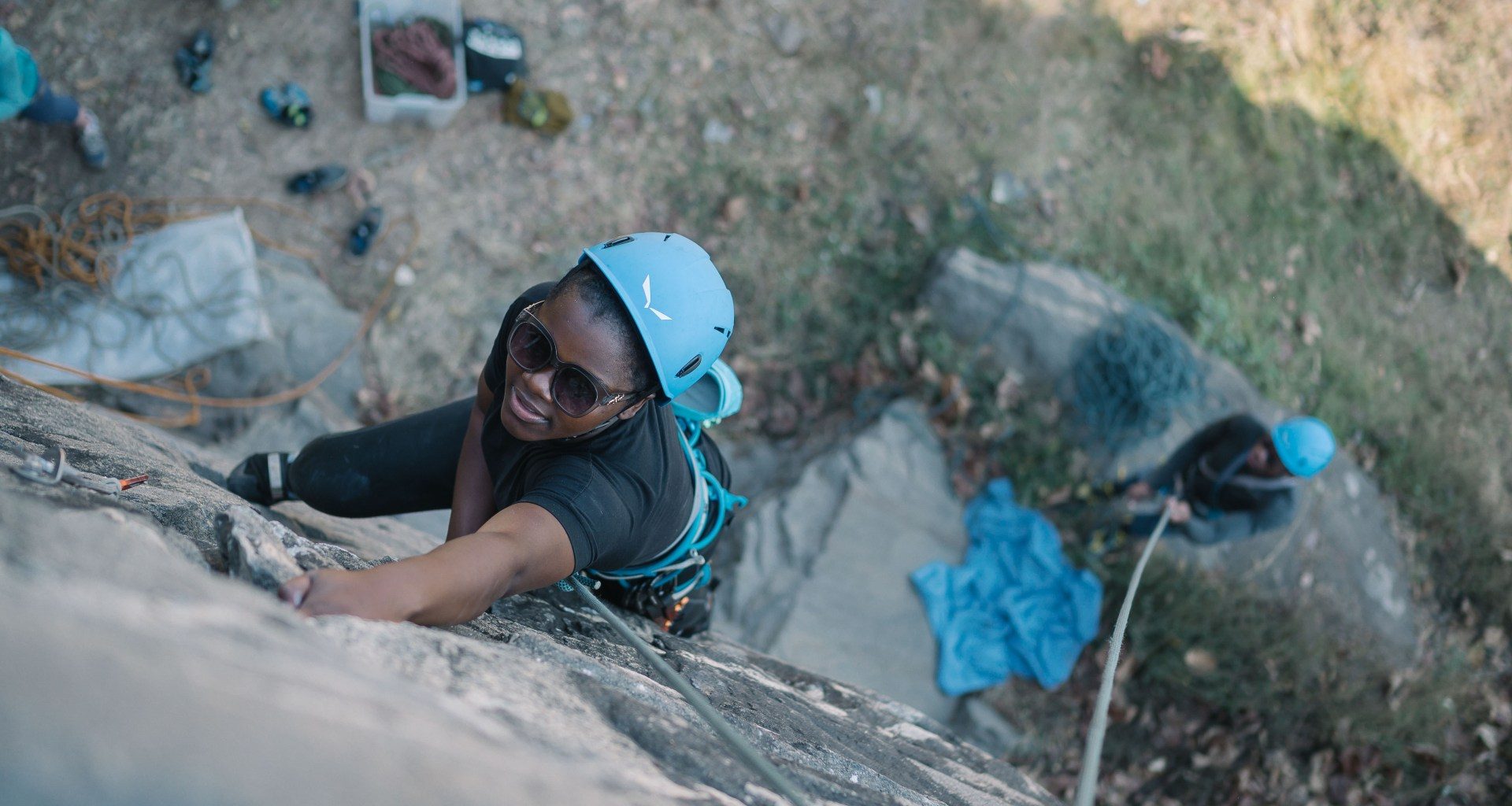
Mulundi, Malawi – Shalom Maholo dangles off the side of a rock face with a power drill in her hand. The 22-year-old steadies herself before drilling a hole in the wall, which she carefully cleans with a brush, then hammers in a bolt that she tightens with a wrench.
She straps the gear to her harness, abseils downwards for two metres and then does it all again, and again and again for 20 metres until she touches the ground 90 minutes later. It’s a physically exhausting, highly technical process which Shalom must get exactly right because climbers here will rely on these bolts for their survival for decades to come.
She’s creating a new climbing route, up which climbers can clip their ropes into pre-drilled bolts for protection while ascending. But here in Mulundi, on Malawi’s western border with Mozambique, Shalom is also making history. She’s the first Malawian woman to bolt a new route in the country, which she names Zikomo, meaning “thank you” in Chichewa.
“Climbing has done so much for me,” says Shalom. “People here think it’s something only white men do, but I want to show that climbing is for everyone, it’s for ladies and it’s for Malawians.
“We’re women, and society thinks that we cannot do it, but we need to take these barriers out.”
In the last decade, climbing has gone from a niche sport to a worldwide sensation and multibillion-dollar industry. The sport made its debut at the 2020 Summer Olympics in Tokyo and will feature again in Paris this year, while the Oscar-winning documentary, Free Solo, turned Alex Honnold into a star when he climbed the 3,000-foot (914m) El Capitan mountain wall without any rope or safety gear in 2017.
In 2022, The New York Times said that climbing could be the “future of tourism” in Malawi thanks to its soaring granite rock faces that have drawn comparisons with Yosemite National Park in the United States, one of climbing’s global hubs. But while Yosemite alone has more than 2,000 sport climbing routes, Malawi has yet to hit 50.
Shalom is still one of just a handful of Malawians who are trained to develop new climbing routes, but this is a diverse group of volunteers, with a mix of men and women as well as people of different ages, dedicated to seeing Malawi fulfil its potential as a climbing country.
The Climb Centre, an open-air gym in the capital, Lilongwe, is the beating heart of this cause. The gym is operated by Climb Malawi, an NGO which aims to attract young Malawians to climbing, create new routes across the country and develop Malawi’s local and international climbing scene.
‘I know I can do it, too’
In one of the world’s poorest countries, where two-thirds of the population lives on less than $2 per day according to the World Bank, climbing as a sport can be prohibitively expensive. Climbing shoes alone can cost at least $30 (bought online from abroad). But Climb Malawi says it will never turn someone away if they cannot pay for appropriate equipment or for the costs of travelling to climbing sites – all these things are subsidised through voluntary donations from those who can afford it.
A partnership with the Global Climbing Initiative – a non-profit that aims to equip climbing communities worldwide with knowledge and resources – has also helped provide professional education to a new generation of climbers and route setters.
But there are also challenges. There is nowhere to buy bolts, rope or climbing shoes in Malawi, according to Climb Malawi, so climbers rely on donations, imports and volunteers to provide this equipment. Malawi is one of the five countries most affected by extreme weather events, according to the Global Climate Risk Index. This means that both flooding and extreme heat of up to 40 degrees Celsius (104 degrees Fahrenheit) during the hot season from September to November can limit climbing opportunities.
The biggest challenge of all is attracting more Malawians to the sport. Climbing is still far from mainstream in Malawi, and while it may be a perfect place for it, the sport needs Malawians for it to thrive and for those who are already building a community to inspire others.
Celebrate Nhlane, 18, is a regular at the Climb Centre, but she never thought she would get the chance to bolt new climbing routes in the country. But, after seeing Shalom finish Zikoma, she says she’s desperate to be next.
“If she’s doing it, then I know I can do it, too,” says Celebrate. “We can make Malawi an amazing place for people to climb.”
Read More: World News | Entertainment News | Celeb News
Aljazera








